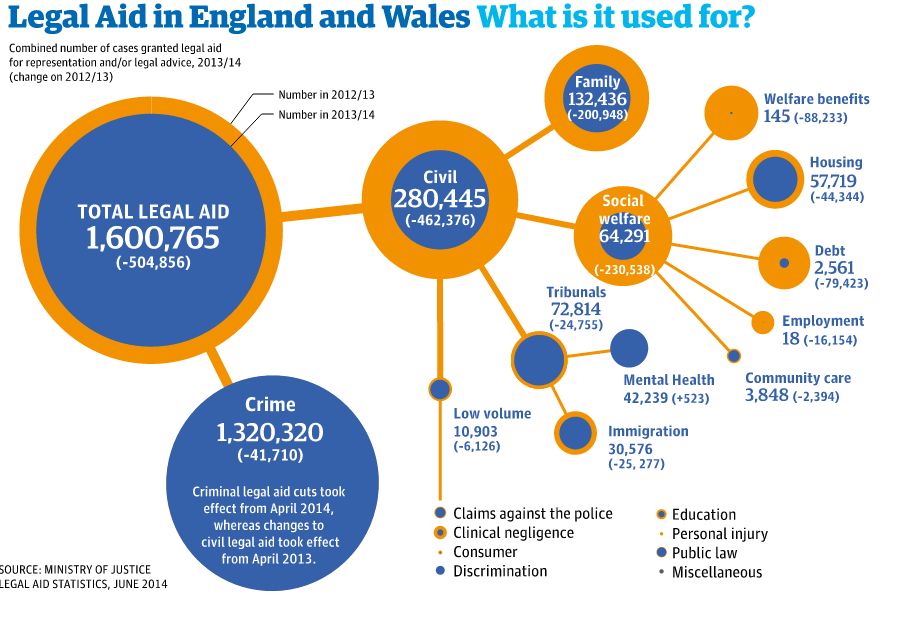As legal aid availability continues to be cut, an increasing number of parents with little to no legal knowledge are being forced to represent themselves in Court for family cases.
Most of these cases are situations whereby custody or time splits for children from an estranged or separated couple is being decided. Whilst finding adequate legal support for low income parents has always been a struggle, since the introduction of the Legal Aid, Sentencing and Punishment of Offenders Act in 2013, which was defeated 14 times in the House of Lords, the problem has undoubtedly become far more serious.
Solicitor firm providers by category of civil legal aid work (Government Statistics)
| Financial Year/Quarter | Legal Help | Mediation | Civil Representation | |
| 2012-13 | Apr-Jun | 2,570 | 148 | 2,683 |
| Jul-Sep | 2,490 | 146 | 2,647 | |
| Oct-Dec | 2,456 | 144 | 2,639 | |
| Jan-Mar | 2,384 | 150 | 2,645 | |
| 2013-14 | Apr-Jun | 2,381 | 166 | 2,596 |
| Jul-Sep | 2,294 | 176 | 2,536 | |
| Oct-Dec | 2,199 | 172 | 2,665 | |
| Jan-Mar | 2,124 | 168 | 2,547 | |
| 2014-15 | Apr-Jun | 2,065 | 155 | 2,459 |
| Jul-Sep | 1,926 | 153 | 2,365 | |
| Oct-Dec | 1,846 | 162 | 2,321 | |
| Jan-Mar | 1,830 | 159 | 2,224 | |
As this table (1) shows, the number of solicitor firms that have been providing legal aid has decreased significantly over the last three years, whilst the number of firms providing legal aid for mediation proceedings has not changed much over time.
The consequences of this drop in legal aid providers has been a dramatic drop in access to legal aid, with overall legal aid provision in 2012-13 dropping by more than 500,000 to 1.6 million cases. More specifically, family hearing legal aid provision dropped by 200,000 to 132,000 and social welfare legal aid dropped by 230,000 to 65,000.
In almost every type of case, legal aid provision has dropped significantly, with criminal cases experiencing the least withdrawal of legal aid support.
The LASPO 2012 Act, which was enacted in 2013, took legal aid off the table for family cases (unless there was proof of domestic violence) and housing and debt cases (unless they significantly impacted the family) and most clinical negligence cases.
Resulting issues
The inevitable truth is that the vast majority of cases where legal aid has been removed involve people who are vulnerable due to poverty, abuse and lack of access to education.
Another resultant issue is that increasing instances of self representation is leading to cases that do not take into account how long the case takes to complete, or the impacts of a contested hearing.
Increased self-representation has inevitably lead to more extended hearings, which are clogging up the system as legal definitions and paperwork issues cause delays. Without appropriate legal knowledge, both parties in a custody hearing are likely to lack legal sense, be less clear and cause confusion in arguments.
A confused and extended hearing is liable to create more animosity and frustration, which will only negatively impact the child further.
“The Children Act says that the welfare of the child is paramount in these cases, which is a given. But it also says delay is the enemy of a child’s best interests, and so anything which means that the resolution of a child’s interests takes longer, must be damaging to the child.”
– Crispin Masterman (Family Judge)
Potential solutions
The government has suggested that in decreasing the provision of legal aid, they are encouraging families and parties to seek mediation rather than attempting to represent themselves in Court. This works well in theory, as mediation is often more amicable and can lead to a smoother settlement.
However, the table shows that people are not seeking mediation, with the instances of mediation barely changing whilst self-representation rises and legal aid drops.
The Ministry of Justice has put into action changes to provide legal aid for mediation hearings for both parties, and hopefully this will result in an increase in this cheaper, quicker and less stressful alternative to the court system being taken up more frequently, although as I have commented in an article for ADR Times, this move does have all the hallmarks of ‘using a sticking plaster to treat a severed limb’.
Conclusion
The continuing consequences of the LASPO 2012 Act are still being realised, but support and solutions are being put into place. The Ministry of Justice is aware of the weaknesses in the decision, but looks likely to stay the course; it will attempt to improve the civil justice system in the long run, whilst fighting the teething issues that the current system is showing.
Although these changes will save the government money, until sustainable long term solutions are available to those who truly need legal help, the vulnerable and those in poverty will suffer in the short term.
In the meantime, there are non-governmental directions a worried parent or spouse can take. There are no-win, no-fee lawyers (that will still end up costing you) and there are also legal charities that are able to support some cases (but still not enough).



